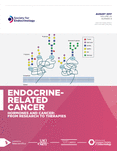WOMEN IN CANCER THEMATIC REVIEW: Diverse functions of DNA methylation: implications for prostate cancer and beyond
- Correspondence should be addressed to A H Ting; Email: tinga{at}ccf.org
Abstract
Prostate cancer is one of the most common malignancies in men worldwide. Current clinical screening ensures that most prostate cancers are diagnosed while still organ confined, but disease outcome is highly variable. Thus, a better understanding of the molecular features contributing to prostate cancer aggressiveness is being sought. For many cancers, aberrant genome-wide patterns of cytosine DNA methylation in CpG dinucleotides distinguish tumor from normal tissue and contribute to disease progression by altering the transcriptome. In prostate cancer, recent genomic studies identified cancer and high grade-specific differential DNA methylation in gene promoters, gene bodies, gene 3′ ends and at distal regulatory elements. Using examples from developmental and disease systems, we will discuss how DNA methylation in each of these genomic contexts can contribute to transcriptome diversity by modulating transcription initiation, alternative transcription start site selection, alternative pre-mRNA splicing and alternative polyadenylation. Alternative transcripts from the same gene often exhibit altered protein-coding potential, translatability, stability and/or localization. All of these can have functional consequences in cells. In future work, it will be important to determine if DNA methylation abnormalities in prostate cancer modify the transcriptome through some or all of these mechanisms and if these DNA methylation-mediated transcriptome alterations impact prostate tumorigenesis and aggressiveness.
- Received 5 September 2016
- Accepted 7 September 2016
- Made available online as an Accepted Preprint 7 September 2016
- © 2016 Society for Endocrinology












